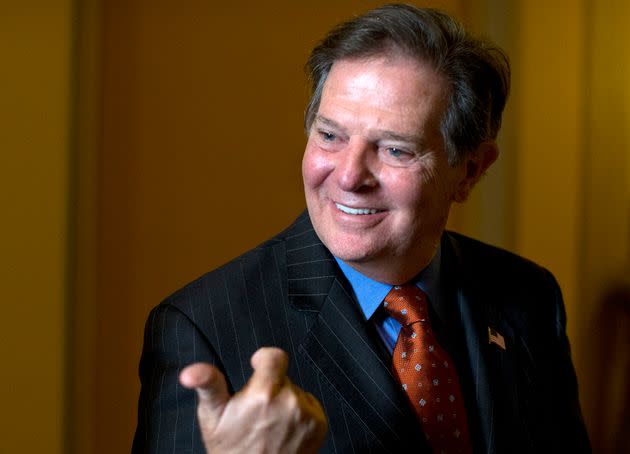Even If Donald Trump Wanted To Be Speaker, House GOP Rules Say He Can't
- Oops!Something went wrong.Please try again later.
- Oops!Something went wrong.Please try again later.
- Oops!Something went wrong.Please try again later.
- Oops!Something went wrong.Please try again later.
WASHINGTON — Some House Republicans are saying they would like former President Donald Trump to become the next speaker of the House.
The problem? Republicans’ own rules forbid someone under criminal indictment for a felony from serving in party leadership.
Nevertheless, Reps. Marjorie Taylor Greene (R-Ga.), Troy Nehls (R-Texas) and Greg Steube (R-Fla.) have stated that they want Trump to be speaker — and the former president is reportedly considering a visit to the Capitol next week, ahead of an election for the House’s top job.
The chamber has been leaderless since Rep. Matt Gaetz (R-Fla.) triggered a no-confidence vote that ended the speakership of Rep. Kevin McCarthy (R-Calif.) after just nine months. So far, Reps. Jim Jordan (R-Ohio) and Steve Scalise (R-La.) have announced bids to succeed McCarthy.
Another problem for Trump is that a lot of moderate Republicans probably wouldn’t vote for him. Rep. Mike Lawler (R-N.Y.), for instance, was outright disgusted by a question about a possible Speaker Trump.
“Is that your biggest concern right now? Really?” Lawler said Wednesday. “Is that really your biggest concern?”

Republican Tom DeLay leaves a meeting on Capitol Hill in September 2013, following the decision by a Texas court to toss out his money laundering conviction. A related indictment against him had led to his stepping aside from a party leadership post in 2005.
It’s unclear if Trump’s visit to Capitol Hill as House Republicans embark on a process to select McCarthy’s replacement would be more of a pep talk or a potential bid for the role.
Asked Wednesday if he would want to become speaker, Trump said unspecified people had asked him about it but that he was instead concentrating on regaining the White House, which he lost in 2020.
“A lot of people have been calling me about speaker. All I can say is that we’ll do whatever’s best for the country and the Republican Party,” he told reporters during a break in his business fraud lawsuit trial in New York City.
“I’ll do whatever it is to help. But my focus, my total focus, is being president and, quite honestly, making America great again.”
Even if he were interested in the speakership — a position not limited to U.S. representatives — the key obstacle for Trump is thatHouse GOP rules bar anyone under indictment from leadership or committee roles.
Trump currently faces four separate indictments in various state and federal jurisdictions, resulting in 91 felony charges and the threat of yearslong prison terms. He remains free on bail.
Under Rule 26(a), “A member of the Republican Leadership shall step aside if indicted for a felony for which a sentence of two or more years imprisonment may be imposed.” While the conference rules are approved before each new Congress, that particular rule has been on the books for some time.
Similarly, the rules say indicted members have to step aside from the standing committees they serve on until cleared of wrongdoing. But unlike in the case of leadership posts, the rules permit the conference to waive the committee step-aside requirement by a simple majority vote.
A lot of people have been calling me about speaker. All I can say is that we’ll do whatever’s best for the country and the Republican Party.Former President Donald Trump
The last time a member of House party leadership — defined as one of the top three leaders — was indicted, they stepped aside. Tom DeLay, a Republican from Texas, left his post as majority leader under then-Speaker Dennis Hastert (R-Ill.) in September 2005 after a grand jury accused him of conspiring to violate political fundraising law to help House candidates in his state.
DeLay was ultimately convicted on money laundering charges and sentenced to three years in prison, but the verdict was thrown out by an appeals court in 2013.
It’s not entirely clear if Trump actually intends to travel to the Capitol next week. Spokespeople for Trump and several Capitol Hill offices ignored requests to confirm the reports about his possible visit.
The previous time Trump wanted to visit the Capitol was in January 2021, amid the riot he had started as part of his effort to overturn the 2020 presidential election. But his Secret Service detail wouldn’t let him, citing security concerns.
The prospect of Trump revisiting what Democrats see as the scene of the crime left them distinctly unenthused.
Senate Majority Leader Chuck Schumer (D-N.Y.) posted on social media: “No thanks, we’re good. We’ve seen a Trump rally at the Capitol already.”
